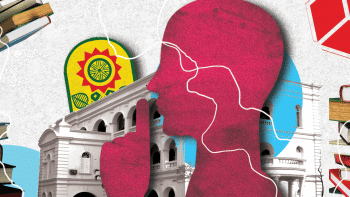Why did Tagore have to be 'disappeared'?

How ironic – or perhaps how fitting – that a statue protesting the recent incidents of censorship and repression in Bangladesh must meet the tragic fate of "forced disappearance." Its removal by the Dhaka University authorities without so much as a warning or a show-cause notice to the artists who installed it on the campus, and the wording used to justify such an action, only solidifies the message the artists were trying to push forth in the first place: that the freedom of thought and expression in the country are under attack.
The statue in question was that of Nobel Laureate Rabindranath Tagore, with his mouth taped, holding a book that had a nail pierced through it. It was set up on Tuesday by leftist students of DU near the Raju Memorial Sculpture, apparently to highlight the current climate of censorship and shrinking space for free thinking and creativity in the country, and was supposed to be in place till the end of February. The statue's placement near the entrance to Ekushey Boi Mela – a day after the Bangla Academy filed an appeal challenging the High Court order to allow Adarsha Prokashoni a stall at the fair – could also be interpreted as a criticism of the increasingly rigid stance of the academy on censorship of books that challenge the dominant state-endorsed narrative.
We recognise that there is an issue of permission, and that the DU authorities cannot simply allow everyone to arbitrarily erect statues on the campus without oversight or say. However, we are completely taken aback by the authorities' explanation – that they demolished it as it represented a "degraded culture" and that the poet's sculpture was "distorted." What exactly do the authorities mean by "distorted" or "degraded culture"? We can only assume that they take issue with protest art and demands for free speech, for that is clearly what the statue signified.
If anything is out of place in a university that is historically linked to progressive student politics and mass struggles for emancipation in the country, it is the DU authorities' heavy-handed handling of the matter. It goes without saying that a university campus is one where students should be free to explore and exchange ideas, engage in constructive debates and experiment with different modes of artistic expression. Unfortunately, over the years, we have seen our campuses being held hostage by ruling party cadres, with the administrations implicitly or explicitly furthering the interests of the ruling party and clamping down on dissent. The space for critical thought – which ought to be a crucial component of higher education – is sorely missing on our campuses, and indeed in our society at large.
The ban on Adarsha Prokashoni, as well as on Jannatun Nayeem Prity's book Jonmo o Jonir Itihash from the ongoing book fair, have already painted a bleak picture of artistic freedoms – or the lack thereof – in the country. We are alarmed to see that bodies such as the Bangla Academy and DU, which ought to be autonomous and custodians of free thought, are now playing increasingly authoritarian roles, arbitrarily shutting down critical discourses and artistic expressions. We urge the authorities to remember our foundational and constitutional commitments to work towards a society where, to quote Tagore, the mind is without fear, where knowledge is free, and where the clear stream of reason has not lost its way.

 For all latest news, follow The Daily Star's Google News channel.
For all latest news, follow The Daily Star's Google News channel. 





Comments